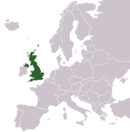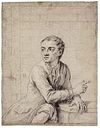Portal:United Kingdom
2008/9 Schools Wikipedia Selection. Related subjects: Countries; Portals
The United Kingdom Portal
 |
|
The United Kingdom of Great Britain and Northern Ireland (usually shortened to the United Kingdom, the UK or - informally - Britain) is a country and sovereign state that lies to the north-west of the continent of Europe. It occupies all of the island of Great Britain and the north-east part of the island of Ireland, sharing a land border with the Republic of Ireland. The United Kingdom is bounded by the Atlantic Ocean, and its ancillary bodies of water, including the North Sea, the English Channel, the Celtic Sea, St George's Channel, and the Irish Sea. It is linked to France and Continental Europe by the Channel Tunnel.
The United Kingdom is a constitutional monarchy composed of four constituent countries: England, Scotland, Wales and Northern Ireland. The current monarch is Queen Elizabeth II, who is also the Queen and Head of State of fifteen other Commonwealth Realms, including Canada, Australia, New Zealand and Jamaica. The Crown Dependencies of the Channel Islands and the Isle of Man form a federacy with the United Kingdom collectively known as the British Islands. The UK also has fourteen overseas territories, all remnants of the British Empire which at its height encompassed a quarter of the world's surface and population.
Although Britain was the foremost great power during the 19th century, and a superpower in the early 20th century, the economic cost of two world wars and the decline of its empire in the latter half of the 20th century diminished its status in global affairs. However, as a permanent member of the United Nations Security Council, a nuclear power, a member of the G8, the world's fifth largest economy, and having the third highest defence spending, the UK remains an important political, economic and military world power. It is a member of the European Union and the Commonwealth of Nations.
Featured article
The corporation tax is a tax levied in the United Kingdom on the profits made by UK-resident companies and associations. It is also levied on non-UK resident companies and associations which trade in the UK through a permanent establishment. The tax was introduced by the Finance Act 1965, which simultaneously removed companies and associations that became liable to corporation tax from the charge to the income tax. The tax borrowed its basic structure and many of its rules from income tax. Recently the tax has come under pressure from a number of sources. Tax competition between jurisdictions has reduced the headline charge to 30 percent; judgments from the European Court of Justice have found that certain aspects of UK corporate tax law are discriminatory under European Union treaties and are expected to continue to do so; and tax avoidance schemes marketed by the big accountancy and law firms and by banks have threatened the tax base. The British government has responded to the last two by introducing ever more complex legislation to counter the threats. ( )
Featured biography
Jack Sheppard was a notorious English robber, burglar and thief of early 18th-century London. Born into a poor family, he was apprenticed as a carpenter but took to theft and burglary in 1723, with little more than a year of his training to complete. He was arrested and imprisoned five times in 1724 but escaped four times, making him a notorious public figure, and wildly popular with the poorer classes. Ultimately, he was caught, convicted, and hanged at Tyburn, ending his brief criminal career after less than two years. The inability of the noted "Thief-Taker General" (and thief) Jonathan Wild to control Sheppard, and injuries suffered by Wild at the hands of Sheppard's colleague, Joseph "Blueskin" Blake, led to Wild's downfall. Sheppard was as renowned for his attempts to escape justice as for his crimes. He returned to the public consciousness in around 1840, when William Harrison Ainsworth wrote a novel entitled Jack Sheppard, with illustrations by George Cruikshank. The popularity of his tale, and the fear that others would be drawn to emulate his behaviour, led the authorities to refuse to license any plays in London with "Jack Sheppard" in the title for forty years. ( )
Featured picture
The Lindisfarne Gospels is an illuminated Latin manuscript of the gospels of Matthew, Mark, Luke and John. The manuscript was produced on Lindisfarne in Northumbria in the late 7th century or early 8th century, and is generally regarded as the finest example of the kingdom's unique style of religious art, a style that combined Anglo-Saxon and Celtic themes, what is now called Hiberno-Saxon art.
Did you know...
- ...that British activist Emmeline Pankhurst (pictured) once slapped a police officer so she would get arrested to raise awareness about the need for women's suffrage?
- ... that architect Stiff Leadbetter’s house Elvills was the first completely new house of the Georgian Gothic revival in England?
- ... that Reuben Noble-Lazarus became the youngest footballer to make an appearance in the Football League when he came on as a substitute in Barnsley's 3–0 defeat to Ipswich Town on 30 September 2008?
- ... that Sir Trevor Williams of Llangybi in Wales changed sides between Royalists and Parliamentarians four times in the English Civil War, before being imprisoned for the crime of scandalum magnatum?




